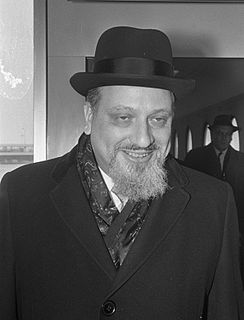A Quote by Mahatma Gandhi
What distinguishes man from the brute is his conscious striving to realise the spirit within.
Related Quotes
Generally there is in man a divinity which strives to push him onward and upward. We believe that this power within him is the spirit that comes from God. Man lived before he came to this earth, and he is here now to strive to perfect the spirit within. At sometime in his life, every man is conscious of a desire to come in touch with the Infinite. His spirit reaches out for God. This sense of feeling is universal, and all men ought to be, in deepest truth, engaged in the same great work—the search for and the development of spiritual peace and freedom.
Now the truth is that the Spirit is within you and you are the Spirit. You are the beauty, the bliss and the joy of that Spirit. That's what you are . Because your attention is not there, that's why you cannot feel your Spirit. But your Spirit exists; it is within you, in your heart, waiting for a moment to come into your conscious mind, to be felt by you in your central nervous system. It's all there, built within you.
Man has reason, discrimination and free-will such as it is. The brute has no such thing. It is not a free agent, and knows no distinction between virtue and vice, good and evil. Man, being a free agent, knows these distinctions, and when he follows his higher nature, shows himself far superior to the brute, but when he follows his baser nature can show himself lower than the brute.
I believe that the unity of man as opposed to other living things derives from the fact that man is the conscious life of himself. Man is conscious of himself, of his future, which is
death, of his smallness, of his impotence; he is aware of others as others; man is in nature, subject to its laws even if he transcends it with his thought.
Compared with the person who is conscious of his despair, the despairing individual who is ignorant of his despair is simply a negativity further away from the truth and deliverance. . . . Yet ignorance is so far from breaking the despair or changing despair to nondespairing that it can in fact be the most dangerous form of despair. . . . An individual is furthest from being conscious of himself as spirit when he is ignorant of being in despair. But precisely this-not to be conscious of oneself as spirit-is despair, which is spiritlessness. . . .
The Scoutmaster guides the boy in the spirit of an older brother... He has simply to be a boy-man, that is: (1) He must have the boy spirit in him: and must be able to place himself in the right plane with his boys as a first step. (2) He must realise the needs, outlooks and desires of the different ages of boy life. (3) He must deal with the individual boy rather than with the mass. (4) He then needs to promote a corporate spirit among his individuals to gain the best results.






































